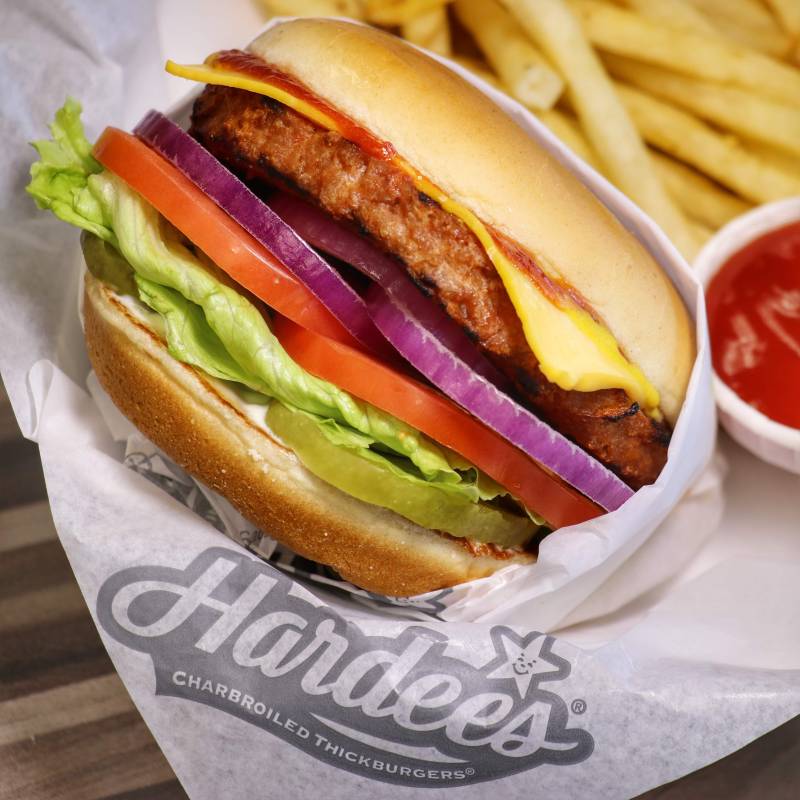In recent years, the demand for plant-based burgers has skyrocketed, driven by growing health concerns, environmental issues, and a desire by eco-conscious consumers to reduce damages that they see to the environment by the consumption of animal products. In addition to concerns related to sustainability, plant-based meats and plant-based meat alternatives are also increasingly popular due to perceived health benefits that are widely observed among those men who enjoy vegan, vegetarian, or indeed just a diet that is low in the consumption of red meat and high in nutrient-rich vegetables. Unfortunately, in the past these plant-based alternatives simply haven't been all that tasty. Options that existed in the past like "Bean Burgers" and "Veggie Burgers" were simply not a realistic alternative for hungry carnivores like myself. Things have changed though ... meatless burgers today are much tastier but are they actually healthier than meat?
Introduction: What's Driving The Demand For Synthetic Meat?
With companies like Impossible Foods and Beyond Meat making headlines and fast-food giants like Burger King offering meatless alternatives, many people are wondering if these plant-based options can truly be considered healthier than their beef counterparts.
In this blog post, we'll unveil the truth behind synthetic meats to determine whether they're indeed a better choice for your health or simply an industry hype aimed at steering consumers away from traditional burgers.
Key Takeaways
- Plant - based burgers are generally healthier than meat burgers due to their higher nutrient density, lower saturated fat and cholesterol content, reduced risk of chronic diseases, and environmental benefits.
- However, not all plant - based options are created equal. It's important to read labels carefully and choose products that fit your dietary preferences and needs. Some may contain processed ingredients or high sodium content.
- Incorporating plant-based foods into your meals can boost dietary quality and aid in weight loss – both essential factors for decreasing chronic metabolic disease risks. A balanced diet that includes whole grains, fruits, vegetables, and other plant-based proteins should be maintained for optimal health.
- Overall switching to a delicious plant-powered burger over a beef patty is an investment in long-term well-being while also contributing positively towards animal welfare and reducing environmental impact.
Nutritional Comparison: Plant-Based Vs. Meat Burgers
Because these plant-based products are designed to be healthier alternatives, there is an interesting line of innovation that is occuring in the industry between making burger patties that are as close to actual ground beef burgers and something that is well, frankly better for you while still tasting great.
For example, with Impossible Burger, Every 4 oz. serving of Impossible Beef contains:



- 19g of protein (the same as 80/20 ground beef)
- 0mg cholesterol (6g saturated fat)
- 25% the daily value of iron
- No antibiotics or animal hormones
However, they also have a leaner product, Impossible Beef Lite Made From Plants that offers 180 calories vs 230, slightly more protein and fiber, less fat and sodium as well as a boost in certain nutrients such as Potassium, Thiamin, Niacin, Vitamin B6 and others.
Higher Nutrient Density In Plant-Based Burgers
Plant-based burgers are making a name for themselves as they often pack higher nutrient density compared to traditional beef patties. For men looking to improve their health, this can be an appealing choice as these meat alternatives generally boast of higher fiber contents while still providing essential nutrients like calcium and iron.
Even though plant-based burgers provide essential vitamins and minerals, it's crucial not to solely rely on them for your nutritional needs. Maintaining a balanced diet that includes whole grains, fruits, vegetables, and other plant-based proteins is vital in achieving optimal health.
Lower Saturated Fat And Cholesterol Content
One of the key benefits of plant-based burgers for men looking to improve their health is the significant reduction in saturated fat and cholesterol content compared to traditional beef burgers.
High levels of saturated fat have been linked with several health problems, including high blood pressure, risk of heart disease, and weight gain.
Moreover, unlike beef burgers that are loaded with cholesterol, plant-based options generally contain zero cholesterol. Cholesterol is an essential component in our body; however, having too much cholesterol may lead to cardiovascular diseases over time.
Health Effects Of Plant-Based Vs. Meat Burgers
From a health and diet perspective, the biggest perceived benefit that people can see from embracing a meat alternative vs ground beef is that you can reduce the dangers posed by excess red-meat consumption and in some cases benefiting the body by introducing easier to digest plant-based meat products with fewer calories from fat. There is some debate about whether or not this makes it a healthy diet but plan-based products are something we encourage all men to try at least once.
Reduced Risk Of Chronic Diseases
Switching to plant-based burgers can significantly reduce your risk of developing chronic diseases, such as heart disease, cancer, and type-2 diabetes. Studies have demonstrated that men who adopt a plant-based diet tend to experience better overall health compared to those who continue to consume meat products.
Moreover, incorporating plant-based foods into your meals can boost dietary quality and aid in weight loss – both essential factors for decreasing chronic metabolic disease risks.
By choosing a delicious plant-powered burger over a beef patty, you're not only making a healthier choice for yourself but also contributing positively towards animal welfare and reducing environmental impact.
The Environmental Impact of Animal Meat Production
The environmental problems caused by animal meat production are alarming. Livestock farming is responsible for approximately 14.5% of global greenhouse gas emissions, with beef production accounting for the majority of these emissions. Moreover, the expansion of cattle ranching has led to widespread deforestation, especially in the Amazon rainforest. This destruction of natural habitats not only contributes to climate change but also leads to the loss of biodiversity.
Water pollution is another pressing issue. Animal agriculture produces large amounts of waste that often contaminate water sources, leading to dead zones in oceans and rivers. Additionally, livestock farming consumes vast amounts of water, with beef production being especially resource-intensive.
Comparing the Carbon Footprint of Plant-Based Alternatives
A study conducted by the University of Michigan compared the environmental impact of the Beyond Burger to that of a traditional beef burger. The findings revealed that the Beyond Burger generates 90% less greenhouse gas emissions, requires 46% less energy, and uses 99% less water and 93% less land than a beef burger.
Similarly, Impossible Foods claims that its products produce 89% fewer greenhouse gas emissions, use 87% less water, and require 96% less land than conventional beef. These substantial reductions in resource use and emissions make plant-based meat alternatives a more sustainable choice for consumers.
Potential Concerns With Processed Ingredients In Plant-Based Burgers
While plant-based burgers are often touted as a healthier alternative to meat, some people have raised concerns about the processed ingredients they contain. Many of these products use highly-refined oils, such as coconut oil and expeller-pressed canola oil, which can be high in saturated fat.
While these burgers are a great option for those looking to reduce their meat consumption, there are some downsides to consider. Plant-based alternative burgers can be high in sodium and calories, and they may not provide the same amount of protein as traditional beef burgers. Additionally, some plant-based burgers contain additives such as preservatives or artificial flavors that may not be ideal for those looking for a more natural option. It is important to read labels carefully when choosing a plant-based burger to make sure it fits your dietary needs and preferences.
It's worth noting that not all plant-based burgers are created equal. Some companies use more natural ingredients than others or prioritize non-GMO and organic sourcing. As always, it's important to read labels carefully and choose products that fit your dietary preferences and needs.
Comparing Different Plant-Based Burgers
Let's take a closer look at the nutritional content and ingredients of some of the most popular plant-based burgers. While these were once found only in specialty retailers such as Whole Foods, today you can find them in most Grocery Stores and I've even seen them available in some well-stocked urban markets like Walmart's Neighborhood Market as well as some gas-stations that sell frozen foods. Truly we've gotten to a point where Americans are open to alternatives to animal protein when it comes to meat consumption.
Impossible Burger
The Impossible Burger, a plant-based meat alternative, has been gaining popularity in recent years due to its sustainability and health benefits. Made by Impossible Foods with vegan ingredients such as soy protein concentrate and coconut oil, the Impossible Burger is entirely free of animal products.
When compared to beef in a 100-gram comparison, the Impossible Burger has more favorable stats for protein and fiber content. Additionally, unlike real-meat burgers which are high in saturated fat and cholesterol, the Impossible burger has lower levels of these unhealthy components.

Beyond Burger
Beyond Burger is a popular plant-based burger that has gained popularity in recent years. It contains pea protein, coconut oil, potato starch, and cocoa butter as some of its main ingredients. This meat alternative doesn't contain cholesterol or the high amounts of saturated fat found in beef burgers. In addition, creating Beyond Burger uses significantly less water and land than producing a beef patty.
It's also a good source of plant-based proteins and vitamins while offering an equally satisfying taste as real meat products.
Aldi Earth Grown Veggie Soy Burger
Aldi's Earth Grown Vegan product line offers a plant-based burger option called the Veggie Soy Burger, which is a great alternative for those looking to reduce their meat intake.
Compared to traditional beef burgers, Aldi's veggie soy burgers are lower in calories and fat, making them a healthier choice. They are also an excellent source of protein, with similar protein content compared to other popular plant-based burgers like the Impossible Burger and Beyond Burger.
BOCA Original Vegan Veggie Burgers
BOCA Original Vegan Veggie Burgers are a popular plant-based alternative to traditional beef burgers. Made primarily from soy protein concentrate, these veggie burgers have less saturated fat than their meat counterparts. They also contain no cholesterol and are low in calories, making them a healthier choice for men looking to improve their health. In addition, BOCA veggie burgers pack a punch when it comes to fiber content with each patty containing 4 grams of dietary fiber.
Meatless Farm Burger
Meatless Farm Burger is one of the top plant-based burger choices for men looking to improve their health. This vegan burger has 21 grams of protein and is made with whole food ingredients such as pea protein, brown rice, and chicory root fiber. The Meatless Farm Burger is also low in saturated fat and cholesterol-free, making it a great alternative to beef burgers. It's easy to cook on the grill or stove-top and provides a delicious meaty flavor without sacrificing your health goals.
MorningStar Farms Incogmeato Burger
MorningStar Farms, a popular brand in the plant-based burger industry, offers an intriguing product called Incogmeato Burger Patties. This particular patty boasts a high protein content and less fat than traditional animal-based burgers. While other products on the market are striving to mimic the texture and taste of meat, MorningStar Farms is instead focusing on creating a unique flavor profile that stands out from its competitors.
Unfortunately, Kellogg (the parent company of MorningStar Farms) discontinued this product in 2023.
Field Roast Chef's Signature Burger
Field Roast Chef's Signature Burger is a delicious plant-based option for men looking to improve their health. This burger is handcrafted with fresh garlic, onions, and carrots, making it not only tasty but also nutrient-dense.
It has received positive reviews from customers, who appreciate its unique flavor profile. However, in a taste test of the best vegan burgers, this burger was noted to be more fragile when cooking and have an uneven size.
Overall, while it may not be perfect in shape or texture, Field Roast Chef's Signature Burger is still a healthier choice than traditional beef burgers due to its lower calorie content and absence of saturated fat and cholesterol.
Dr. Praeger's Perfect Burger
Dr. Praeger's Perfect Burger is a top choice for health-conscious men looking to switch to plant-based burgers. This delicious patty contains 20g of protein and 30% of daily iron, making it a great source of nutrition.
What sets Dr. Praeger's burger apart is that it is made with pea protein and does not contain any soy or gluten, making it suitable for those who have allergies or intolerances.
Whether you're trying to reduce your meat intake or simply looking for healthier options at the grocery store, Dr. Praeger's Perfect Burger offers both nutritional value and flavor satisfaction.
Before The Butcher Uncut Plant-Based Burger
One of the top options for men looking to improve their health is Before the Butcher's UNCUT Plant-Based Burger. These burgers come in two 4 oz. patties that look, cook, and taste like traditional beef burgers but offer a healthier alternative at an affordable price of $5.49.
The plant-based patty contains natural ingredients such as apple extract and cocoa butter while being high in protein with lower saturated fat content than real meat. Additionally, Before the Butcher offers a Mainstream line of 100% plant-based, vegan, and gluten-free patties for those seeking a more restrictive diet without compromising on taste or value for money.
OZO Plant-Based Burgers
OZO Plant-Based Burgers are a relatively new addition to the growing plant-based meat market. They are made with pea protein and have a similar taste and texture to traditional beef. OZO burgers contain 22 grams of protein, which is high compared to some other plant-based burger options.
One thing that sets OZO burgers apart from other plant-based options is that they do not contain soy or gluten. This makes them a great alternative for those with allergies or intolerances to these ingredients.
Additionally, OZO uses expeller-pressed canola oil instead of coconut oil, which has been linked to higher levels of saturated fat.
Conclusion: Plant-Based Burgers Can Be A Healthier Choice Than Meat Burgers
After looking at the nutritional comparison and health effects of plant-based burgers versus meat burgers, it's clear that plant-based options can be a healthier choice - if you are willing to accept the downsides of ultra-processed foods. With higher nutrient density, lower saturated fat and cholesterol content, reduced risk of chronic diseases, and environmental benefits, switching to plant-based burgers could be a good idea for improving overall health.
However, one thing that I've noticed from my experience with Impossible Burger products is that they are often prepared on the same grill or processing equipment (when I've ordered it Burger King for instance). So while this is potentially a healthier option for meat eaters like myself, it is far from something that would be your best choice for a vegan diet since it is ultimately the animal fats coating the patty that make it so delicious and palatable. Your preferences may vary though and my tastes differ from day to day. On some days I like a nice lean beef burger that I can pile high with lettuce and tomato and other times I want a big, thick, juicy patty to wrap my hands around. Plant-based meat burgers fit in that spectrum too and it is a good thing that the industry continues to innovate!
